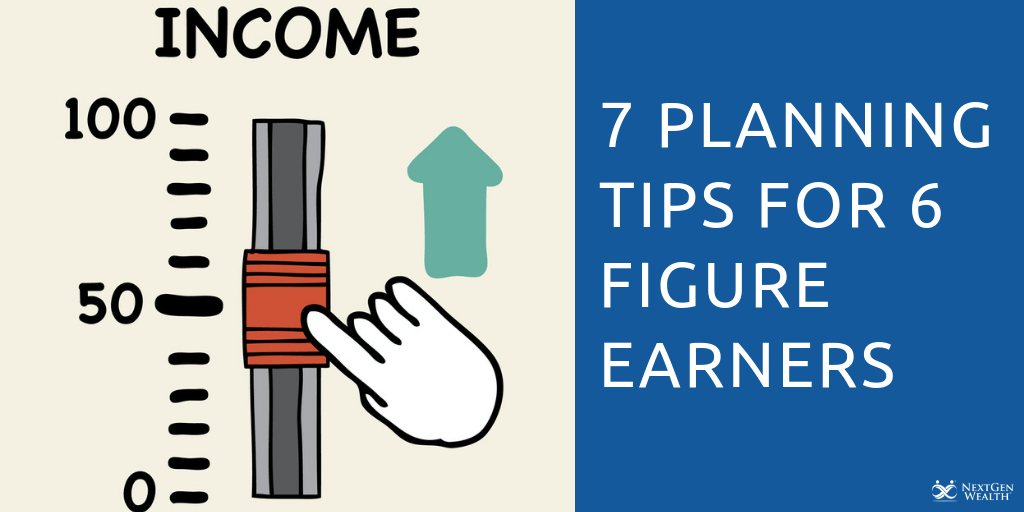7 Planning Tips for 6 Figure Earners
Making a lot of money and being wealthy are not synonymous. Even if you make six figures, you can still feel stretched to pay your bills if you don’t take the appropriate steps to build wealth.
While having a high income is a good starting point, if you spend everything you make, you’ll find yourself feeling strapped. Getting the right financial planning information can help get you on the right track toward growing your net worth.
The planning tips below will help you get on (or back on) the right financial track.
How are Six-Figure Earners Different?
Before we dive into some strategic tips for building wealth, let’s talk about why six-figure earners differ from the general population. Making a lot of money sets them apart all in itself, however, they also have to consider other implications.
Many tax-advantaged savings vehicles such as the Roth IRA have income limits around contributions. This makes it more difficult to minimize the tax burden for individuals making six figures.
The more money you make, the higher your tax bracket. Taking advantage of tax-advantaged accounts can help you minimize your tax burden and keep more of your paycheck. This is where talking with a qualified financial advisor can help you come up with a plan.
7 Ways Six-Figure Earners Can Build Wealth
The basics of personal finance apply across the board no matter how much money you make - maximize income, minimize taxes, and spend less than you earn. High earners face additional challenges due to their income status.
If you’re looking to build wealth, here are seven financial planning tips to get you on the right track.
Create a budget
Just because you make six figures, doesn’t mean you should forego a budget. A budget is a powerful tool for keeping track of your spending and making sure you don’t overspend. Having a high income won’t matter if you spend every last cent and have nothing to show for it.
Budgeting helps you see where your money is going each month. It’s a spending plan that helps you track how you’re spending your paycheck. There are different types of budgets you can create but if you’re just getting started, go with the basics.
Use your current spending as the basis for your budget. Review your spending for the last six months and use it to create general spending categories such as utilities, entertainment, groceries, housing, and so on.
Don’t forget to include irregular expenses that only come due every three or six months such as your car insurance. Once you have your basic spending outlined, look at how much you’re spending in each category and ask yourself if you’re happy with it or if you need to cut back.
Use this as an opportunity to get your spending in line with your values. If you enjoy travel, make sure you budget for a vacation at least once a year. Don’t enjoy eating out or simply trying to lose a few pounds? Cut back in that area so you can save more toward traveling.
Automate your savings
Just because you have a high income doesn’t mean you’re sitting on a fat bank account. If you feel like most of your paycheck gets spent before it hits your bank account, there’s a chance you’re correct.
Saving money is important for building wealth and creating a safety net. However, it can be hard to remember to transfer money to savings every month. The solution for that is to automate as much of the process as possible and treat your savings as a fixed expense just as you would your mortgage. In other words, PAY YOURSELF FIRST!
Have your retirement account contributions taken out of your paycheck - you won’t even miss them. If your employer offers a company match, contribute at least enough to get the full amount. Set your contributions to increase by at least one percent every year to take advantage of your annual salary increase.
If your employer offers the option to split up your paycheck deposit, consider directing a portion of it to a savings account. You will never see the money, so you won’t miss it. Open a high yield savings account and have the money deposited there. It’s a great way to hide the money from yourself and avoid spending it unnecessarily.
Learning to live on less also means you need less income in retirement. Spending six figures a year means you need your retirement accounts to produce six figures to keep pace. Spend less and you’re automatically ahead with your retirement savings.
Plan for taxes
Making a plan to minimize your tax burden is especially important for six-figure earners. Since the U.S. has a progressive tax system, the more you earn, the more of your paycheck goes to Uncle Sam.
The more you earn, the more likely you are to be subjected to the Alternative Minimum Tax (AMT), which can put a big dent in your earnings. Putting the right plan in place can help you plan for taxes and minimize your tax burden.
Here’s where a certified personal accountant can help you figure out how to keep more of your hard-earned paycheck. Getting the right deductions and tax shelters in place can mean thousands of dollars of difference.
In addition, consult with an estate planning attorney who can help you figure out how to avoid taxes when passing down your estate to your heirs. Setting up the right tax structure will make a big difference in how much taxes your family will owe.
If you plan to give part of your wealth to charities, an attorney can help you make a tax plan for charitable giving. There are a number of tax planning moves such as setting up a donor-advised fund that can give you an upfront tax deduction.
Since the tax code changes regularly, it’s important to consult with someone who’s familiar with the current rules and regulations.
Consider a Roth IRA conversion
Due to the Roth IRA income limits, not everyone can qualify to contribute. Since there are no such rules for non-deductible traditional IRAs, high-income earners can take advantage of this savings vehicle and then convert that money into a Roth IRA.
This is also what’s known as a Backdoor Roth IRA. It makes a lot of sense for individuals who do not qualify to contribute to a Roth IRA because of income limitations. This is a great way for high-income earners to take advantage of a Roth IRA.
You can also check out a Roth IRA conversion for other monies sitting in traditional IRA’s or 401k’s. These make a lot of sense for individuals who happen to have moved into a lower tax bracket for the year for some reason or another. Talk to a qualified financial advisor who can evaluate your individual situation to determine if it makes more sense to pay taxes today or defer it until retirement.
Create an estate plan
As mentioned previously, having an estate plan in place is especially important when you earn a high income. This will ensure you preserve the majority of your wealth and pass it along to your offspring rather than handing it over to the tax man.
There are many laws and regulations around estate planning, so consult with an estate planning attorney. The current tax law has specific provisions about estate and gift taxes that directly affect high net worth individuals.
An attorney can help you structure your current estate plan so you can take advantage of the estate tax limit. They can also ensure that you’re not passing on more of your wealth to your heirs than you intend to during your lifetime.
Draft a long-term financial plan
Having the right plan in place is especially important for those earning six figures. High earners get lulled into a sense of financial complacency because of their sizable paychecks. When you earn a lot of money, you can be fooled into thinking you’re untouchable.
This is where a long-term financial plan will help you get your finances in order and ensure your family is covered in case something happens to you or your income. Talk to your spouse about what is important to you as a couple.
Consider how much you want to sock away for retirement and how you plan to pay for your children’s education. Talk about your financial goals for the future such as buying a second home or investing in income-producing assets.
If you have dependents, it’s important to have a plan in place to protect them in case you pass away. This means getting the right type of life insurance in place and getting enough to cover your family’s current lifestyle.
If you’re the family’s breadwinner, you will also need a plan in place if you lose your income. While earning a high income makes it seem like nothing could go wrong but if your job goes away tomorrow, how will you pay your bills?
Once you have an idea of your goals and concerns, talk to a financial advisor who can help you formulate a long-term financial plan. This can serve as your financial blueprint for maximizing your paycheck and socking away enough to pay for retirement, your kids’ education and so on.
Avoid lifestyle inflation
When you make a high income, it’s easy to lose track of your spending. Many people who make a lot of money also fall prey to expectations of how they should spend their money. They end up spending money on fancy cars and expensive clothes because they think this is what everyone expects.
How much money you earn is only part of the building wealth equation. The second part is how much of your paycheck you save and invest for the future. Focus on spending the majority of your paycheck on appreciating rather than depreciating assets.
Instead of spending your money, directing toward wealth-building tools like investing. Try to save at least 20-25 percent of every paycheck no matter how much you make. This will give you a buffer in case you experience a drop in income. It can also help you build your retirement savings.
Getting used to a fancy lifestyle makes it more difficult to scale back your spending. If you’re used to dining out at Michelin star restaurants and staying at five-star hotels, anything less can feel like deprivation.
Don’t let your spending take your high paycheck from a nice-to-have to a must-have. This will chain you to your job and can stall your career advancement. If you create a lifestyle that depends on your paycheck, it will make it harder to take risky career moves that can pay off in the long term.
Don’t compare yourself to other high earners. This can skew your perception of what is normal and make you feel like you’re missing out by not having the latest and greatest. Since the median income according to the 2017 Census is $61,372, earning six figures means you’re better off than by far the majority of Americans and, believe it or not, that you’re in the top 10% of the world when it comes to income.
The Bottom Line
Earning a six-figure income does not make you wealthy automatically. You need a plan to ensure that you’re not squandering your financial blessings on depreciating assets such as expensive cars or fancy clothes.
Making the right financial planning moves can be the difference between having money and spending every last dime. It’s possible to have a high income and negative net worth. Set up your finances in such a way that you maximize how much of your hard-earned money you get to keep for yourself.
Applying the planning tips above will ensure that you direct your income toward building wealth. With the right financial tools and professional help, you can create a plan that will maximize your income and build your net worth.
This is a post from Clint Haynes, a Certified Financial Planner® and Financial Advisor in Kansas City, Missouri. He is also the founder and owner of NextGen Wealth. You can learn more about Clint at the website NextGen Wealth.


